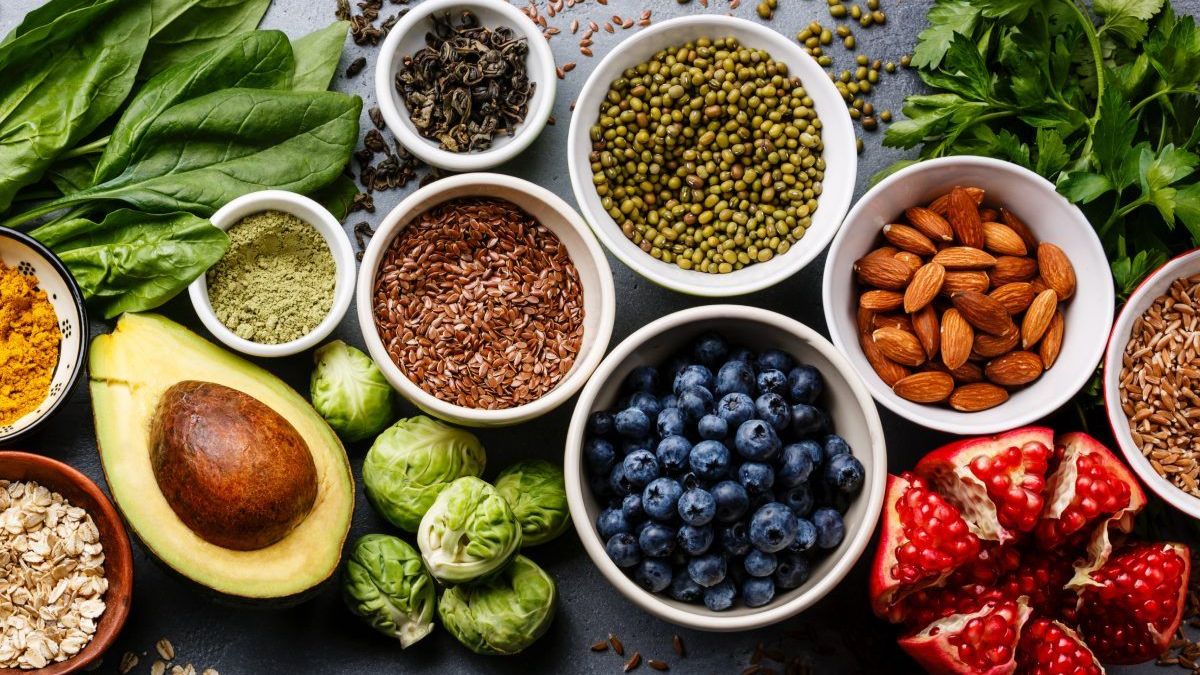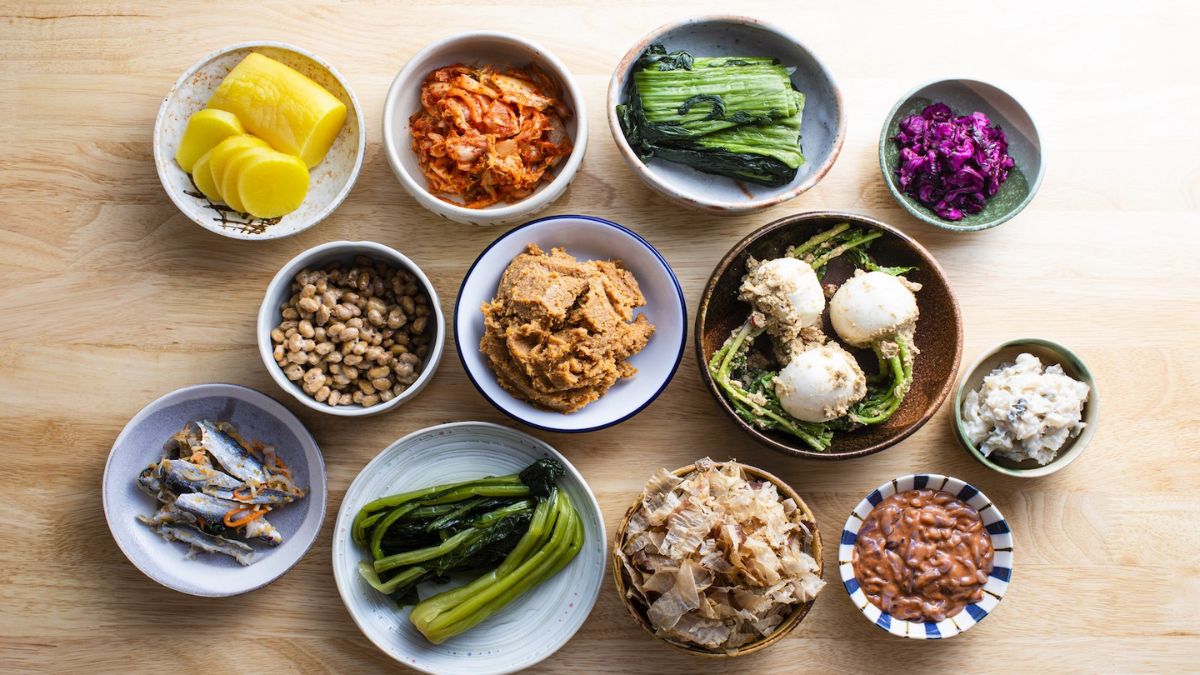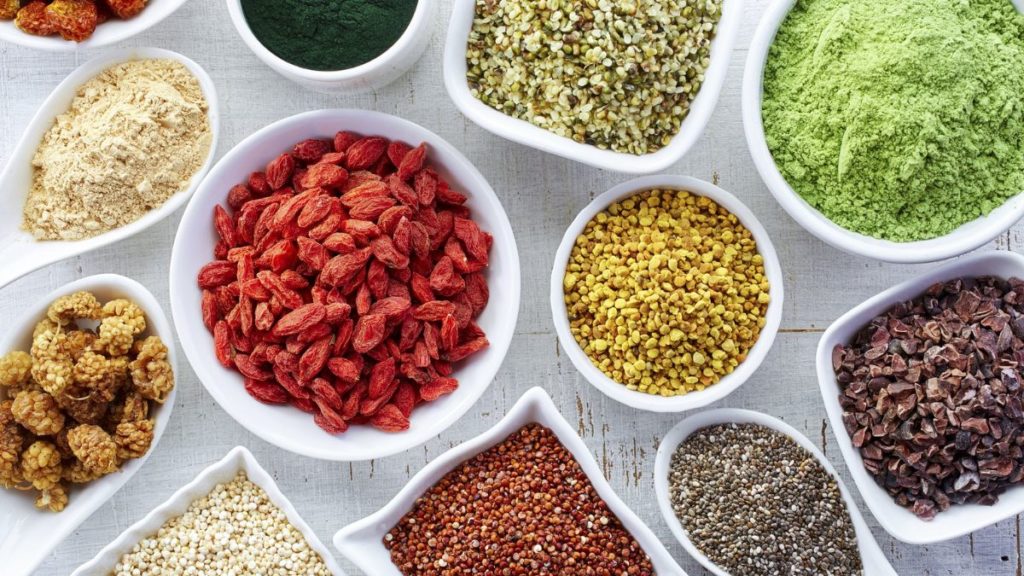You’ve probably seen the word “superfood” on food packages or heard it used to describe menu items and dietary supplements. But what exactly does “superfood” mean? There are no official rules for how superfoods should be categorized, but there are a few foods that most people agree are super (highly nutritious).
Nutritionists say that “superfood” is a way to get people to eat more healthy foods. But this idea is overrated because no single food can keep you from getting sick or improve your health. Some foods are likely to be nutrient-rich, also called “superfoods.” These foods are very good for your health and are good for your body. Our nutritionist has come up with a list of 8 foods that are full of nutrients and should be a part of your diet to prevent diseases and improve your health.
What are Superfoods?
Superfoods are whole foods that are high in antioxidants, vitamins, and minerals that are good for you. They also contain as much nutrition as possible for as few calories. The word “superfood” is a buzzword nutritionists try to avoid because it sounds like the food in question has superpowers and can cure anything wrong with you.
But nutritionists agree that the foods usually called “superfoods” are good for your health and should be a part of a healthy diet. Superfoods aren’t a cure-all but have more nutrients than most foods. Healthy foods are linked to many health benefits and a lower risk of chronic diseases.
Popular Superfoods
People call a lot of different foods “superfoods,” but some of them are easier to find than others. This list has things that are easy to find and that most agree are good enough to be called “superfoods.”
Berries
Berries are naturally sweet and colorful and have a lot of fiber, antioxidants, and flavonoids, which may help the immune system fight cancer. 3 People often say that blueberries are a superfood because they have a lot of manganese and vitamin K. However, other berries like acai, cranberries, raspberries, and goji berries also deserve to be called superfoods. You can eat them fresh or frozen when they aren’t in season.
Berries are a very nutritious and healthy food that can help reduce inflammation and fight free radicals. Berries are a superfood because they have these qualities. People with digestive problems or digestion disorders are often told to eat berries. If you eat berries, you can avoid problems with your digestive system and immune system. Berries also have vitamins, minerals, and fiber that help fight free radicals. Raspberries, strawberries, blueberries etc.
Leafy Greens
Dark greens like collard greens, kale, Swiss chard, and spinach are high in vitamins A, C, and K and are a good source of fiber, magnesium, calcium, and iron. They have few calories and are hard to beat in terms of nutrition per pound. 4 You can eat them raw in salads and smoothies or cooked in many different ways.
Fatty Fish
Salmon, sardines, and mackerel are good protein sources and have a lot of omega-3 fatty acids, which may lower the risk of heart disease and stroke. 5 Even though these fish are healthy to eat, be aware that they can have a lot of mercury in them. Fish that are lower on the food chain, like sardines, tend to have less mercury than fish that are higher on the food chain, like mackerel.
Nuts
Nuts, especially walnuts and almonds, are a good source of plant-based protein and are high in monosaturated fats, which may help lower the risk of heart disease. But they have a lot of calories, so it’s best to eat them in small amounts. A handful of nuts is a better snack than a handful of chips because it gives you more nutrition and makes you feel fuller for longer.
Broccoli and Cabbage
Cruciferous vegetables like broccoli, Brussels sprouts, and cabbage are a great source of fiber and vitamins A, C, and K that are good for your heart. They also have plant chemicals in them that may help prevent some kinds of cancer.
Yogurt
Yogurt is a good source of protein and calcium and has more probiotics, which may be good for your gut health.
Instead, choose plain, organic yogurt or kefir with live and active cultures that are not sweetened or flavored. Yogurt is a healthy alternative to mayonnaise and sour cream, and it can also be used to make smoothies and eaten with granola.
Beans
From chickpeas to kidney beans to soybeans, legumes are a great source of low-fat plant protein, fiber, iron, and folate. Manganese, a trace mineral important for brain health, is also in them. Beans make you feel full for longer, making them a great meat substitute.
Whole Grains
Whole grains get their name because their fiber-rich bran is left on them, making them much healthier than refined grains stripped of their bran. They are a good source of B vitamins and have been shown to lower bad cholesterol. Whole barley, brown rice, oats, buckwheat, rye, and spelled whole grains. Quinoa is often put in this group, even though it is a seed, not a grain because it is healthy.
Seeds
Flaxseed and chia seeds are often used in health food products and recipes. Flaxseed is a good source of fiber and antioxidants and is one of the best plant-based sources of omega-3 fatty acids. Ground flax is the best way to absorb its nutrients, so try adding it to baked goods and smoothies. Chia seeds have nine amino acids and can be used to make vegan pudding or sprinkle on different foods.
Tomatoes
Tomatoes have a lot of vitamin C, beta carotene, and the powerful antioxidant lycopene. Cooking and processing tomatoes make it easier for the body to absorb lycopene. Still, eating raw and cooked tomatoes makes it harder for the body to use other vitamins and minerals.
Other Superfoods
“superfood” is also often used to describe red wine, dark chocolate, green tea, and other foods. Red wine (in moderation) and green tea are full of antioxidants, which may be good for your health. Dark chocolate and cocoa are also high in antioxidants, but it’s best to stick with a high cocoa percentage because too much sugar can cancel out the benefits of chocolate.
Incorporating Superfoods into your Diet
Superfoods have many health benefits, but focusing on just one or two foods is never a good idea. To get the benefits of these foods, you need to eat a variety of whole foods, making a healthy, well-balanced diet. Focusing on plant-based foods and getting the right amount of protein, fat, fiber, and vitamins is very good for your health. Try eating superfoods instead of processed foods and red meat, which are bad for your health. Beans and small amounts of fatty fish are good alternatives to red meat, and a handful of nuts or roasted kale chips are a much healthier snack than processed foods. Switch to whole grains instead of white rice, white pasta, and white flour.
What are Some Superfood Recipes?
Since superfoods are usually things you already know and eat, it’s not hard to think about adding more to your diet. Use these healthy recipes as a jumping-off point to make your meals more exciting:
- Roasted Salmon Fillets
- Mix and Match Granola
- Red Lentil and Tomato Soup
- Vegetable Chili
- Gluten-Free Flax and Almond Flour Muffins
- Vegan Broccoli and Tofu in Garlic Sauce
- Blueberry and Spinach Superfood Green Smoothie
- Kale and Cabbage Slaw With Mustard Vinaigrette
What are the Health Benefits of Superfoods?
Superfoods have a lot of vitamins and minerals, which can help your body fight diseases and keep you healthy. When added to a healthy diet, these foods can improve heart health, help you lose weight, give you more energy, and even slow the aging process.
Many superfoods have antioxidants that may help prevent cancer, and healthy fats can lower your risk of heart disease. Fiber, found in many superfoods, can help prevent diabetes and digestive problems. Phytochemicals, also found in many superfoods, have many health benefits, such as lowering your risk of heart disease. It is also known that superfoods protect your organs from toxins, help lower cholesterol, keep your metabolism in check, and reduce inflammation.
Eating a Well Balanced Diet
Even though superfoods are good for your health and give you many nutrients you need every day, they are not enough to make up a healthy diet. Eating too much of one kind of food can hurt your health and keep you from getting all the nutrients you need. Because of this, superfoods should be added to a healthy diet, not used in place of it.
Meagan Ballard, a dietitian at INTEGRIS, says you can’t get all the vitamins, minerals, and antioxidants you need from just one food. “It is very important to eat a wide range of nutrient-rich foods to get the health benefits our bodies need. There’s nothing wrong with eating food that gives you a lot of a certain vitamin or mineral you need, but our bodies need a lot of vitamins and minerals to work right, so don’t rely on just one superfood.
A healthy, well-balanced diet should include fruits, vegetables, lean protein, whole grains, legumes, and nuts, while sodium, bad fats, and refined sugar should be limited. A healthy, well-balanced diet can do wonders for your health when combined with regular exercise and physical activity.
Do I Need to Get More Superfoods in My Diet?
Many experts agree that eating a wide variety of whole; natural foods is better than chasing after the latest “superfood.” In other words, you don’t have to eat quinoa and chia seeds daily. Switching them out is awesome for simple things like brown rice, peanut butter, or oatmeal with sunflower seeds. “It’s important to remember that a ‘healthy diet’ gives you all the nutrients you need and that one food can’t give you everything,” A healthy diet is based on eating a variety of foods in small amounts, and you should eat foods from each of the food groups.
On the other hand, if you love a certain superfood, it’s usually fine to eat a lot of it. Remember that no single food will make a huge difference in your health, no matter what you might have seen on Instagram. Also, don’t eat so much of one superfood that you can’t eat other healthy foods. Getting various nutrients, tastes, and textures in your food is the best way to support your health and feel your best.
Are Eggs Superfoods?
Eggs are one of the healthiest foods you can eat because they have almost all the necessary vitamins and minerals. Eggs are cheap, taste great, and go well with almost any food, and they are one of the best superfoods out there. Selenium is another nutrient that can be found in eggs. One egg gives you 59% of your recommended daily intake (RDI) of selenium, 32% of your RDI of vitamin A, and 14% of your RDI of iron. These are known to strengthen immune systems, making eggs very useful when cold outside.
Conclusion
No one knows exactly what makes a food a “superfood.” But superfoods are thought to be nutrient powerhouses because they have a lot of antioxidants, phytochemicals (chemicals that give plants their colors and smells), vitamins, and minerals. Most superfoods come from plants, but some come from fish and dairy.
Salmon, kale, acai berries, kefir, and almonds are just a few superfoods that people like. Superfoods don’t have a strict definition, so any food high in nutrients is often put in this category. Most of our products don’t need to be kept in the fridge, but we suggest you keep your superfoods in a cool, dark, dry place and close the packaging completely after each use. Acai Powder and Hemp Seeds are the only two things that should be kept in the fridge after they have been opened.


